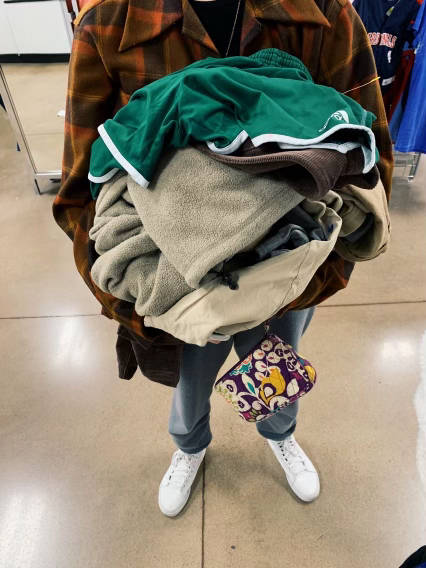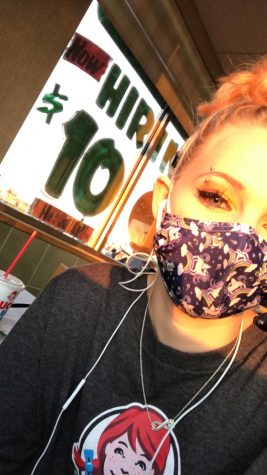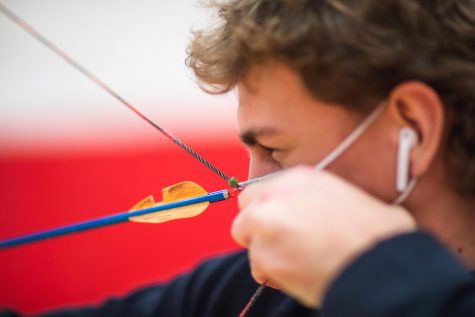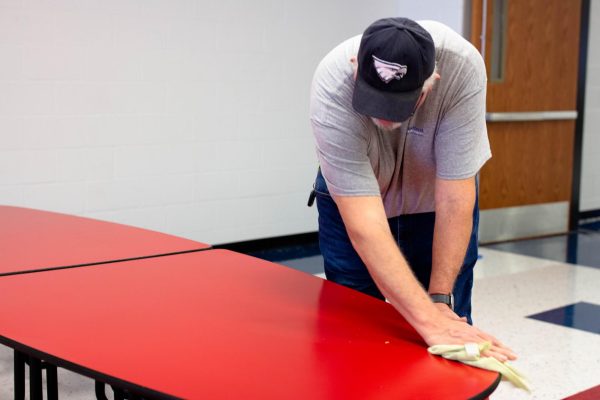From The Runway To The Racks
Fast fashion’s impact on American culture and environment

One of Madeline Francis’s recent hauls from a shopping trip.
February 24, 2021
In a culture where one’s clothes and aesthetics are highly valued, teens want to be on “trend.” This somewhat new, strong desire has created one of environmentalists’ biggest enemies: fast fashion.
Fast fashion is the new trend of the industry where brands look at what celebrities are wearing on the streets or on the runway, quickly and cheaply recreate it, and then sell it for a profit.
The turnaround rate is neck-breaking quick. Not only are the businesses engaging in fast fashion, so are the consumers. Their goal is to produce new clothes at the height of their popularity and sell their products. With America’s fashion culture gaining more power in the general public, the buyers have an instilled fear of outfit repeating, an idea that stems from the fashion industry’s elitism. The consumers in turn have to buy more and more clothes. The problem is that there is a new trend every few months. Tie-dye was in trend and then old vintage t-shirts were in trend, and then weeks later sweaters vests, and patterned pants were in trend.
While quick distribution, lower prices, and more compliments don’t seem all that bad, behind the scenes fast fashion does more harm than good.
When you think of the climate crisis’s causes, you don’t usually think of fashion, however, it is one of the biggest contributors. This unassuming factor in the crisis is a new concern to environmentalists.
According to Business Insider, “Fashion production makes up 10% of humanity’s carbon emissions, dries up water sources, and pollutes rivers and streams.” The business insider also states that “In total, up to 85% of textiles go into landfills each year. That’s enough to fill the Sydney harbor annually.”
Opposite of fast fashion, “ethical” shopping is reliant on the consumer and the values they hold. Ethical fashion depends on the shoppers to be educated in the industry’s notorious reputation of underpaying and mistreating employees. In a nutshell, ethical shopping asks the question, “Is the person who made this garment being paid and treated well?” If the answer is yes, then there’s the green light to purchase the item. If the answer is no, then think about other places where similar items are available, a brand that can check off your box of ethics.
Sustainable fashion has a similar mindset to ethical shopping, however, like fast fashion, the control is in the brand. Sustainable fashion focuses on workers’ rights and social welfare along with focusing on its greater ecological integrity.
Sophomore Madeline Francis, a sustainable and ethical fashion advocate, has brought her business to local resale and thrift shops. She believes that shopping used and local is not only better for the environment, but a way to create her own unique look.
“I think that it is better for the environment, and I personally think you can find a lot more and you can find literally anything,” Francis said. “I found all of these outrageous T-shirts that had ugly patterns on them, that I personally thought were perfect and beautiful in my eyes.”
Francis doesn’t just shop resale because of its environmental impact; she does it because she finds it’s the easiest way to avoid shopping fast fashion.
“I like to go to small businesses and thrift stores where you know who and where your money is going to, you don’t exactly know where your money is going when you shop these big retail owned places,” Francis said. “They aren’t paying their workers enough, there are children who are making your clothes who don’t live good lives, they aren’t getting paid well and getting hurt on the job. Fast fashion is just toxic and not good.”
Instead of fully developing new lines of clothing, fast fashion brands are rushing to throw clothes from the runway to the racks for a money grab. Instead of creating new trends, fast fashion is taking the easy way out by copying and stealing ideas and styles that they believe are “in”. For Francis and other sustainable fashion advocates, shopping local and resale is not only a way to help the environment but is also a way to create their own unique style.


























